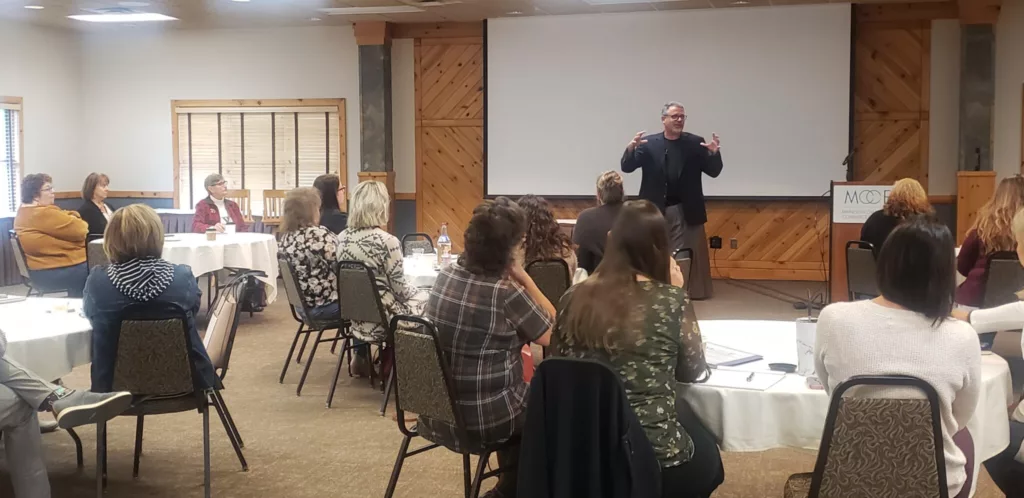Are you looking for a keynote speaker for an upcoming event?
Futurist Keynote Speaker Simon Anderson explains why finding the right person is so critical: “The right keynote can transform your conference or annual meeting by creating a strong foundation for the rest of your agenda to build on. A great speaker will educate and inspire, and create an experience that your audience will be talking about for years to come. Taking time to find a speaker with the right energy, insights, and take-aways for your group is an investment that will pay off many times over, and will have everyone asking ‘where did you find that speaker?’ ”
Finding the right keynote speaker can be a daunting task, but with a little research and some careful planning, you can find the ideal person to make your event a raving success.
Here are our top 10 tips to help you get started:
1. Clarify the Goals for Your Event
To paraphrase the Cheshire Cat in Lewis Carroll’s Alice in Wonderland, “If you don’t know where you are going, any road will get you there.”
Every element of a successful event starts with knowing the ultimate goals for the occasion.
What do you want people to learn or experience? What feeling or knowledge do you want them to leave with at the end of the day?
2. Clarify How the Speaker Fits Into Your Event
There are more speakers available than most people realize, which can make the decision overwhelming.
This is why the entire process starts with you getting specific on exactly what you are looking for from a speaker, and it needs to tie directly into the goals for your event.
Do you want someone to motivate your group to build deeper relationships? Someone to inspire them to realize the importance of their life or job? A technical leader to give deep insights and information? Someone to just make your people laugh? Some combination of these?
Without the clarity, you will probably be disappointed with your speaker, however fantastic they are, as they won’t have advanced your event goals.

3. Know Your Budget for the Keynote Speaker
It will be critical for your search to determine how much you can spend on a keynote speaker. In events, as in life, you generally get what you pay for.
Also bear in mind everyone has bills to pay; requests to a speaker to lower their fee in exchange for what, you perceive, is great exposure, will usually not be received well.
Make sure you figure out the total budget, including hotel and travel costs. Also consider if you want to pay for other elements, such as inviting your speaker to sponsor dinners or event outings; and if you want to purchase any of the speaker’s books or other resources, either for giveaways; or for each attendee.
You can often get a reduced fee from speakers if you are also purchasing copies of their book. At this stage, however, you are just setting your total budget so you can go into the discussions well-prepared.
4. Consider a Speakers Bureau
Speaker bureaus and agencies can be a wonderful resource, especially if you don’t have the time to do the research yourself.
The good news is that the fee that you would pay to a bureau is the same as going directly to the speaker. The bureau receives a commission from the speaker that you book. They act on your behalf and it doesn’t cost you anything extra.
Every bureau has a unique strategy and their own set of speaker requirements. Some bureaus, such as Midwest Speakers Bureau, have a wide range of options including powerful speakers for events with lower budgets.
If you work through a bureau, then they will take you the rest of the way including helping with contracting, payments, communication, and logistics.
5. Create Your Own Candidate Pool
If you have a very specific need, a very limited budget, or just prefer to go it yourself, then it’s time to find your potential speakers. There are a number of ways you can start to compile your list:
- Ask for recommendations from others in your network who have organized similar events.
- Check out speakers from past events similar to yours in different locations.
- Use website apps such as GigSalad, The Bash, SpeakerMatch, and eSpeakers – there are many very talented speakers with a speaking fee of less than $5,000, and most of them use one of these apps. Even if you find potential speakers from other methods, we encourage you to check out their profiles on sites such as these to understand their programs and offerings.
- Do an internet search for keynote speakers. The more specific you can get, the better, as often a search such as “keynote leadership speaker in Minnesota” will end up with links to speaker bureaus and agencies, rather than individual speakers, because of their sheer volume of SEO.

6. Do Keynote Speaker Research
Whether you are using a bureau or finding your speaker yourself, there are a few more steps we encourage you take to ensure you find the perfect fit and leave the audience grateful that you were in charge of finding their speaker! If you use a bureau, their speakers are usually vetted quite well, but we still encourage completing due diligence:
Watch the speaker’s videos online.
Most speakers have a promo video or demo reel to give you a flavor of their style and their message.
These videos are an important part of making your decision, but the level of the videos vary wildly. So don’t be seduced by style over substance. It’s important to realize that a great video does not necessarily mean a great keynote; it might just mean they spend $20,000 on awesome production elements to make themselves look better than they are!
On the other hand, some of the greatest keynote speakers do not have amazing videos; they are simply clips from speaking engagements.
Verify their credentials.
Make sure they have the experience and track record to successfully address the topics you’re looking for? In addition to profiles you may find on their website, we encourage additional research on social media platforms such as LinkedIn to get a broader picture on their work and influence.
Check their references.
Ask your potential speakers for references from past clients and read reviews online to get an accurate sense of what they can offer.
Look into industry sponsors for the event.
If you find the perfect speaker, but they’re over your budget, consider finding an industry sponsor to pay all or part of their fee in exchange for being featured, a booth, etc.
Consider the speaker’s promotional value.
Consider how the speaker could increase attendance at your event (for association or non-employee events). Is this speaker well-known, or at least well-known in your industry?
Their fee might pay for itself with the extra attendance they bring through promotions to their followers. All expectations of promotions must be agreed to in the contract.
Consider hiring for multiple talks.
Workshops, panels, and other add-ons. You can often fill additional slots on your agenda by asking your keynote for additional sessions at a reduced cost.
Research similar events.
Check other industry events that your attendees may have recently attended and see if they just saw your speaker choice at another event. If so, they may not be as interested in attending your event.
7. Have the Conversation
We encourage you to have a live conversation with potential speakers, ideally in-person or over Zoom. There are a number of things you will be looking for, including:
- Are they approachable and relatable individually (will they be chatting with your people at the event)?
- Are they going to be high maintenance? Do they seem to have a lot of demands and are unwilling to be flexible or easy to work with?
- Do they have questions for you about your goals, theme, organization, and event? If they don’t ask or seem to care about this, then consider it a big red flag! The best speakers are those who are willing and indeed keen to customize their remarks to specifically address your goals and audience interests. know they must understand your event in order to customize their remarks to specifically address your goals and the audience’s needs. If they don’t have questions, there is a high chance you will get a canned talk that does not address your specific needs.
- What are their fees, required deposit and travel requirements, as well as technology needs?
8. Make Your Selection
Now it’s time to make your selection! Get in touch with the bureau or the speaker and finalize the details.
You may choose to wait to inform your other options in case there are any issues with your first choice’s contract or details. Most speakers don’t hold your date until they have a deposit, so you want to make sure your first choice is still available before you let others know they were not selected.
9. Clarify the Details and Send the Contract
It is critical to make sure the event planner and speaker are on the same page with all the details. Here are a few things to keep in mind:
- Use a contract that lists all expectations, contingencies, what is or isn’t included, logistics, appearance requirements, etc. A bureau or the speaker will typically have their own contracts, but make sure to review everything on it before signing.
- Remember that half (or sometimes all) of the speaker fee will need to be paid right away to secure your event date for your speaker. This may be a problem if you are depending on sponsor checks or registration fees to cover the speaker fee.
- Get AV preferences from the speaker and check your AV person/staff to make sure it’s all covered.
- Send a full event agenda to speaker; this helps the speakers customize their talks and ensure they are bringing in the various elements from throughout the event.
- Clearly define what materials you need from the speaker and by when you need it. This could include headshots, a promo video, the keynote title and abstract, quotes for social media, an article, or a podcast guest appearance to promote it.
- Content rights. Are you recording the keynote and planning on sharing it? Clear any plans to share speaker content with them before the event and specifically detail what can and can’t be shared in the contract. Many speakers will agree to video or slide deck sharing as long as it’s only for event attendees and not posted publicly.
10. Have a Backup Plan
Things happen, life gets in the way and if the worst comes to the worst, have an alternative session planned for this slot. Some speakers have a video prerecorded that they can send you to use in an emergency. If you are paying for someone to speak at a virtual event, I’d always try to record them at the rehearsal, if you can, so that you are safe in the event of any technical issues on the day. It’s worth including something about this in your contract.
Closing Words on Finding The Right Keynote Speaker
Finding the right keynote speaker can be a time-consuming process, but with a bit of research and some careful planning, you can easily find the perfect speaker for your event. Of course, there are things to do between your selection and the event, but we will have to cover that in another article. Good luck!
About the Authors

Steve Fredlund, known as “The Safari Dude” is an emerging keynote speaker from Minnesota, USA who focuses on helping audiences view their life, work and leadership as an adventure and then gives them insights on how to make it epic. Check him out at SteveFredlund.com.

Clare Forestier is a corporate event host located in the United Kingdom. She helps event organizers deliver sensational and memorable events by joining their team as a charismatic, unflappable and skilled hybrid, virtual, and in-person emcee. Check her out at ClareForestier.com.
